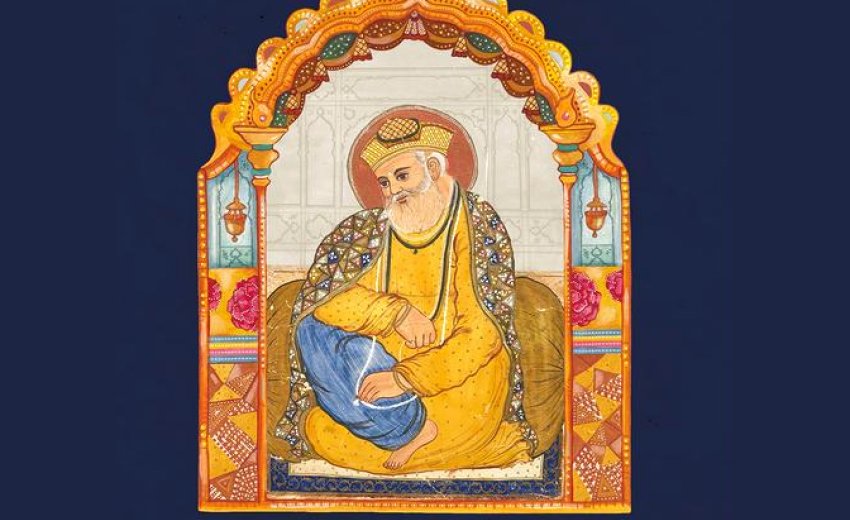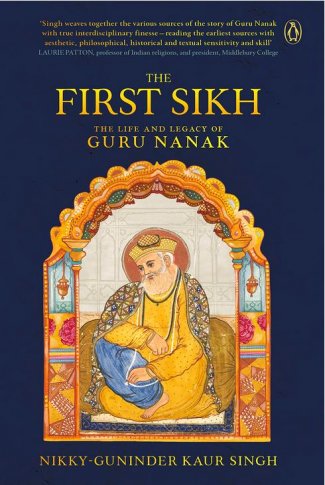Book review by Gurpal Bhuller: [email protected]
The celebrations of Guru Nanak Dev Ji’s birthday in November 2019 are now past, as is the publicity surrounding the Kartarpur Corridor. I am not certain what impression we have made in the minds of the rest of the world about Guru Nanak Dev Ji’s thoughts. But as the memories of those events recede, we are left with one unique legacy in the form of a new book by Nikki Guninder Kaur Singh – “The First Sikh – the life and legacy of Guru Nanak “.
One has often read books on Sikhi that almost seem apologetic in nature. Nikki is having none of that. She begins by exploring Guru Ji’s unique life and takes a refreshingly contrarian view. The approach of Western scholars like McLeod and Smith that Guru Ji’s thinking was a variety of the “Sant” tradition is swept aside. Guru Nanak’s new thinking is highlighted and Gurbani is quoted effectively to show how he regarded himself and his relationship with the “One”.
In this comprehensive book, Nikki has done a nuanced survey of Guru Nanak Dev Ji’s teachings by exploring the Japji and his other writings in the Sri Guru Granth Sahib. It is revealing to see the exploration of Guru Nanak’s mysticism, with a discussion on the formation of the Sikh identity. She uses the Janam Sakhi stories, as well as the writings of Bhai Gurdas, to flesh out details of his life. The originality of his thought, his concept of human rights (including the status of women) and his sensitive treatment of the environment are notable features. This is not a pro-forma acknowledgment of his unique vision but a plea to fresh thinking about the future of Sikhi.
The heavy part of the book is where she starts exploring Sikh philosophy. The “Ik Onkar” concept is analyzed together with its implications. She looks at his ethics, the acquisition of knowledge, pluralism and action. There is a revealing outline of the Japji and the different “Khands”. I found this to be very interesting. If “Sach Khand” is the where the unity with the “One” happens, how does the self get there? The process of developing that mindset is comprehensibly discussed as described in the last pauri of the Japji Sahib.
The relevance of his teachings to the current times makes for an interesting discussion. Guru Nanak was a leader in his time in the field of human rights and equality in the different strata of society including the rights of women. Nikki is an ardent feminist and her writings in this chapter leaves us in no doubt as to where she stands. These are important questions and it is sad that our institutions have failed to tackle them. As the world marches on and societal values change, religion should also look inwards to see if they are indeed carrying the torch that their founder carried. She correctly points out the vast chasm between the writings of Guru Ji and the current practices.
There a few are some shortcomings in this book. This book could have used some editing and less complex English for it to be more accessible to the average lay person. It would have been even more useful if some of the quotes could have been put in the original Gurmukhi script. For those looking at it for the first time, a few illustrations may also have been beneficial.
Overall though, this volume is an outstanding contribution to the study of Guru Nanak Dev Ji. Nikki brings a stellar pedigree (she is the daughter of the late Professor Harbans Singh of Patiala), and her erudition shines in this book. One of her previous translations of Sikh Scriptures “The Name of My Beloved – Verses of the Sikh Gurus” has just been re-published as “Hymns of the Sikh Gurus” by Penguin. These volumes put her in the premier league of Western Sikh scholars.
The current volume deserves to be read by all those seeking to understand Guru Nanak Dev Ji’s thinking. His ideas are of great relevance today and this book needs to be given a place of prominence in all libraries.

